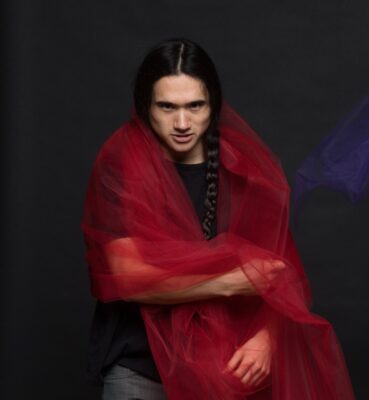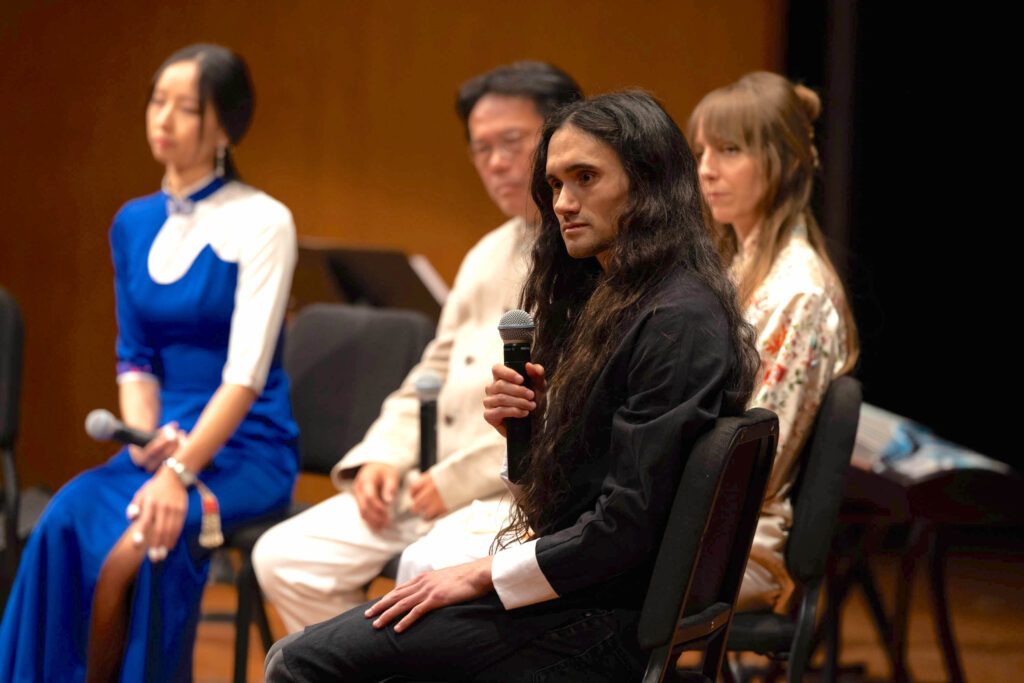 Micah Huang ’13
Micah Huang ’13
Micah Huang’s ’13 work as a composer, musician, and sound artist exposes social injustices as well as explores music’s ability to heal and transform.
As a Fulbright fellow, Huang visited Hungary to work alongside the marginalized Roma people to amplify and help preserve their musical traditions. Two of his recent pieces, Blood on Gold Mountain, a theatrical podcast about the 1871 Chinese Massacre in Los Angeles (2021), and American Dreams/Asian Nightmares (2022) examine the historical and contemporary effects of violence and trauma on Asian Americans and their descendants.
Now his latest efforts involve planning and producing the 2024 L.A. Hungry Ghost Festival, a celebration of Asian American history and culture through music, storytelling, and reimagined traditional practices. Huang’s work on this project has been made possible by his recent selection for Community Partners and California Arts Council’s CA Creative Corps Fellowship.
“It’s really a thrill, and an honor,” said Huang of his selection, noting that he is among 33 artists chosen for the fellowship and “tasked with serving and revitalizing marginalized communities throughout L.A. and Orange counties through arts initiatives.”
Each project is supported by a $100K operational grant, with additional support for partner organizations. The fellowship was created to support artists and culture bearers of all disciplines and practices who, according to the Community Partners website, “have a demonstrated history of working in relationship to a community identified within the lowest quartile of the California Healthy Places Index.”
That fellowship criteria couldn’t be more applicable to Huang, whose musical works seek not simply to expose neglected histories but to inspire conversations about them.
Born in North Carolina, Huang is the child of two peripatetic classical musicians who settled in Southern California and teach at The Claremont Colleges (his parents, Hao and Rachel, both are members of the music faculty at Scripps College).
He decided to enroll at Pitzer as an undergraduate after studying for two years in a cross-discipline studies program at San Francisco State University. As a transfer student, Huang said he was “just overwhelmed by the kind of resources that Pitzer had as a private college. There was just a lot going on. I ended up taking a lot of music courses and [then] doing a self-created major.”
Unlike his parents, Huang wasn’t automatically drawn to classical music. He didn’t study music formally until his teens, and he played guitar in many bands, including a punk band in Pomona. His tastes range widely, including international music, dance, and theater which have all served as influences on his work today. One influential experience from his undergraduate days was Pomona College’s Afro-Cuban Ensemble, a class in which he sang and played the conga and bell. He also learned to play the Dundun (large two-headed drums) and bell in an informal group specializing in Malinke music (from the Mali-Guinea border region) that was organized by his friends and classmates Andrew Kemble ’13 and Justin Dixon ’16.
These experiences, he says, caused him to start “reevaluating some of my own cultural roots, the presence of ancestors, and hearing the sonic properties of that music and East Asian music that is kind of ambient in my consciousness.”
That reevaluation eventually encouraged him to use music to explore the raw and still-painful experiences his own family had endured and, consequently, left unattended. Investigating that wound was an opportunity to convene with his ancestors.
“My family has been one in which lots of violence has manifested in their lives, all the way back to China,” he explained. “My grandfather … my father … we were all walking around with this pain. This anger. There’s still so much that’s been packed in, suppressed and hidden for so long … still unfolding.”
This journey sparked a catharsis for him, but Huang says he still treated it with great trepidation.
“For so long I had tried to keep music safe,” he says. “I had shied away from that for so long. I was afraid that the music, which had been my way of relating to people, would somehow be contaminated by stigma—not only about being Asian American, but being Chinese American, which is a complicated saying in itself.”
But critics have thought otherwise. Blood on Gold Mountain has received critical acclaim from media outlets including the Washington Post, KCRW, and the Orange County Register. Annenberg Media has praised American Dreams/Asian Nightmares for the way it “melds technology and sonic art to build an unforgettable performance exploring the violence Asian Americans have experienced, as well as a look into what the future may hold.”
 Micah Huang ’13 after the performance of American Dreams/Asian Nightmares at Scripps College
Micah Huang ’13 after the performance of American Dreams/Asian Nightmares at Scripps College
Today, with these experiences behind him, Huang looks forward to next year’s festival, which will take place next August and will be associated with activities in L.A.’s Chinatown.
“The music/theatre/storytelling aspect will build on the work my team did with Blood on Gold Mountain and Iron Horse Road,” he said, “in collaboration with the amazing East Wind Lion Dance Troupe, who is our official community partner in Chinatown.”
But it will be more than just an opportunity to stage a performance. Huang is always mindful of the healing focus of his music and the importance of public performances to the healing process.
“Therapy is really trendy now. But it has to be done collectively,” he explained, “and that’s where art and ritual come in. I truly feel that energy—the one that thrives in that network of connection. I believe in that energy. I really do. It has the power to effect real change.”